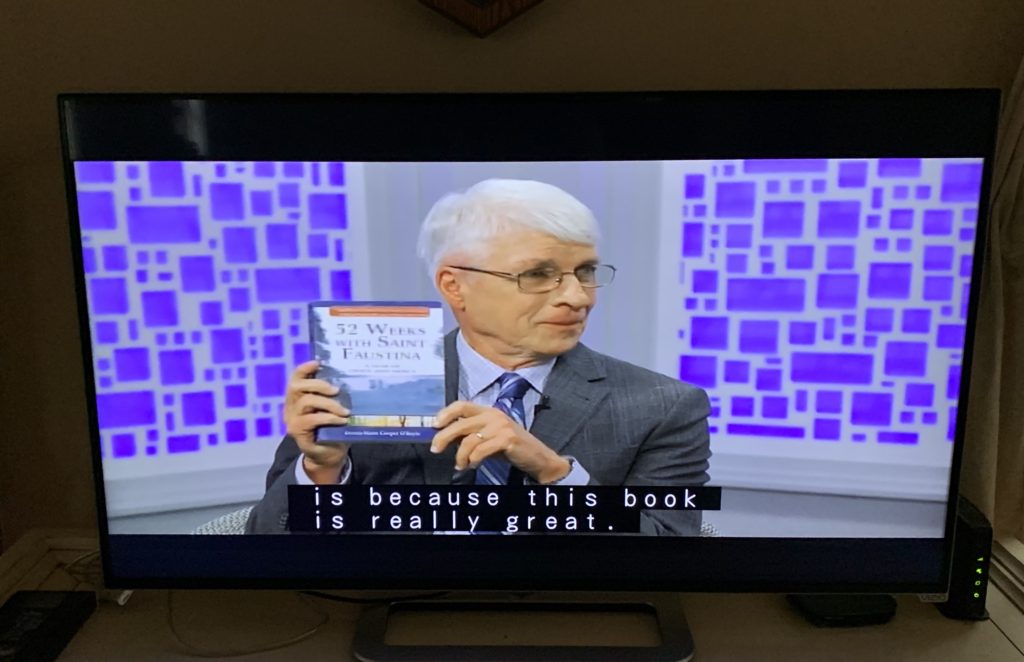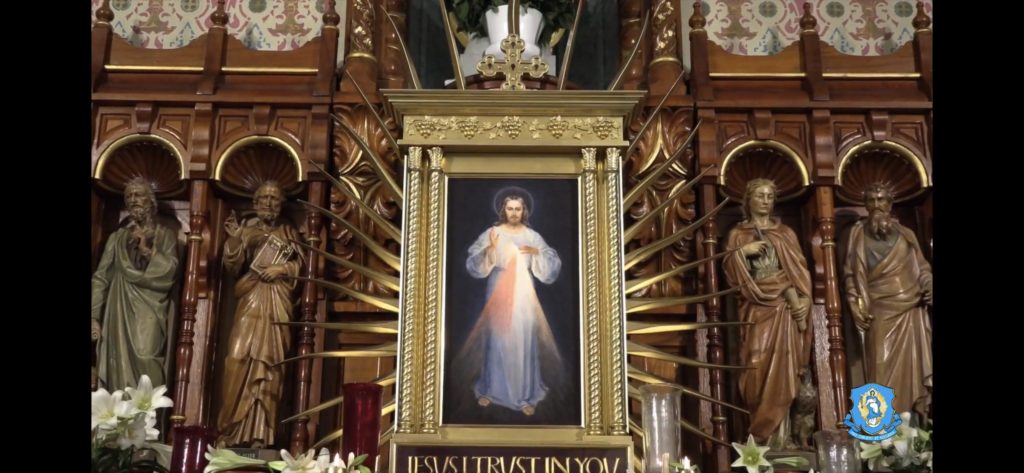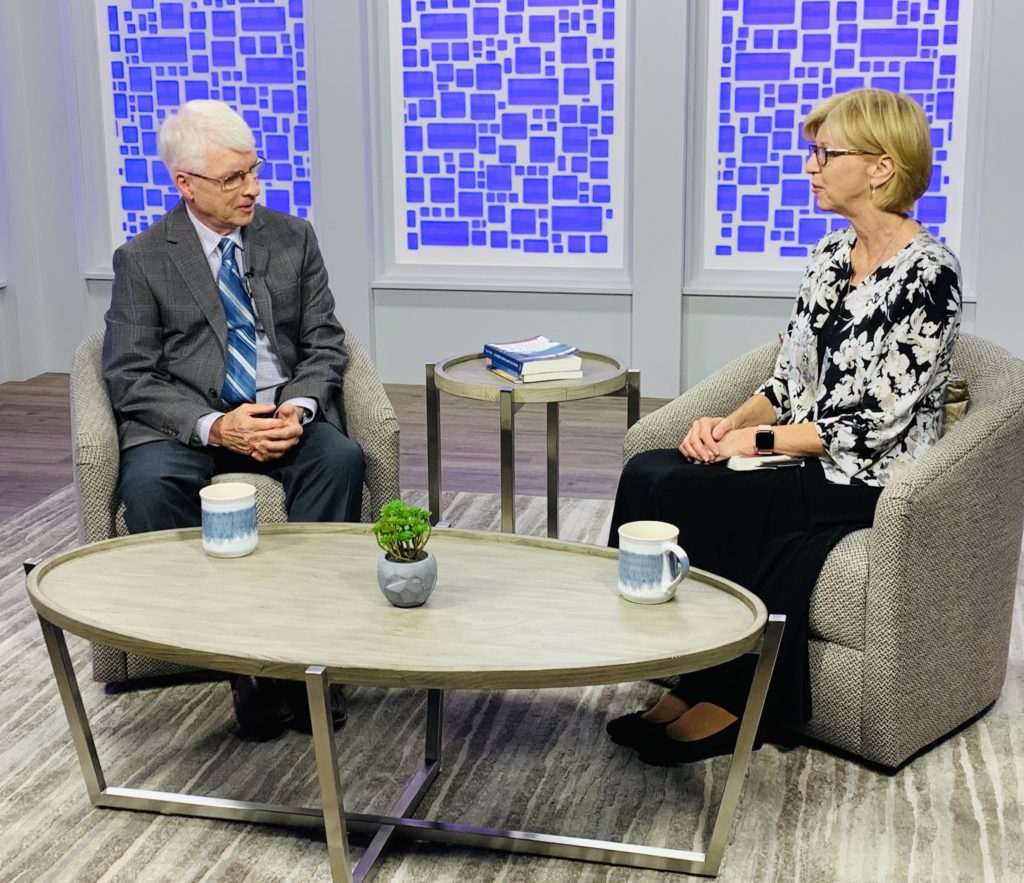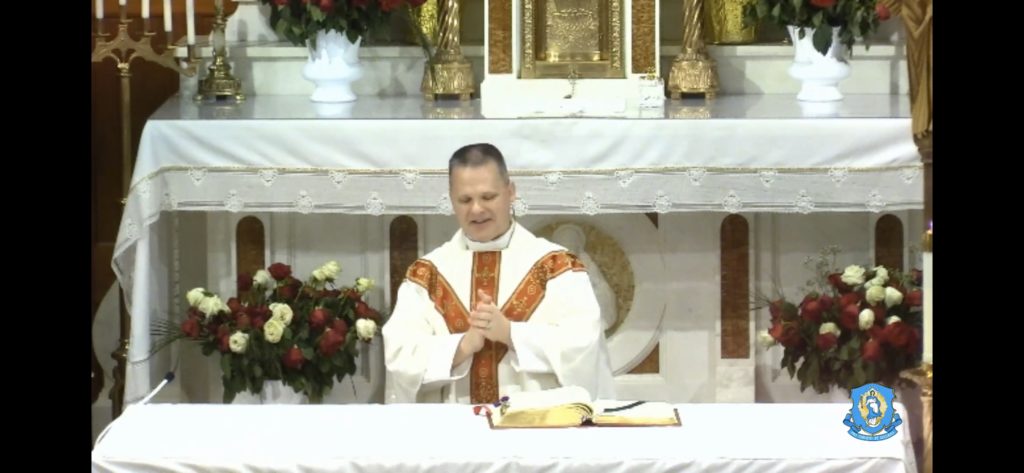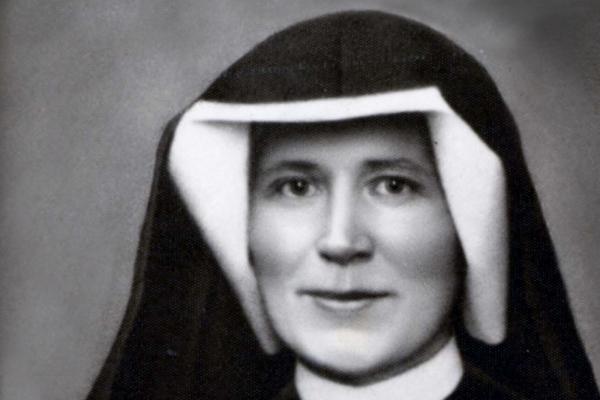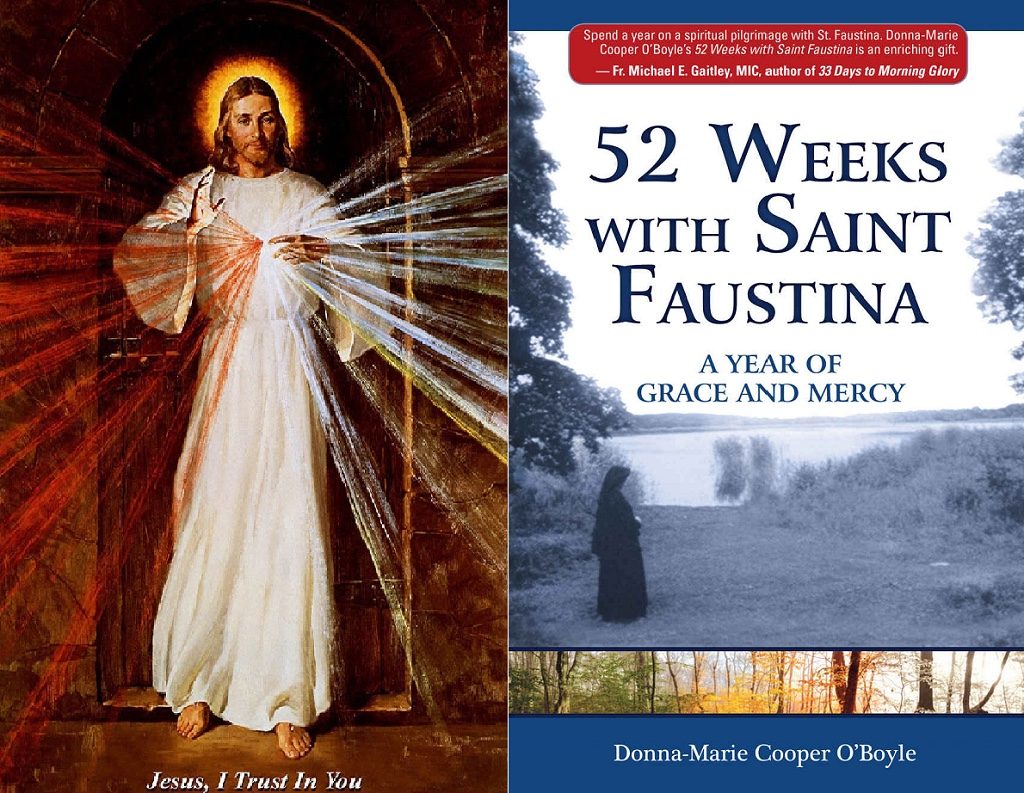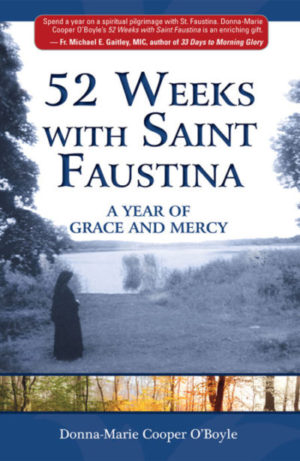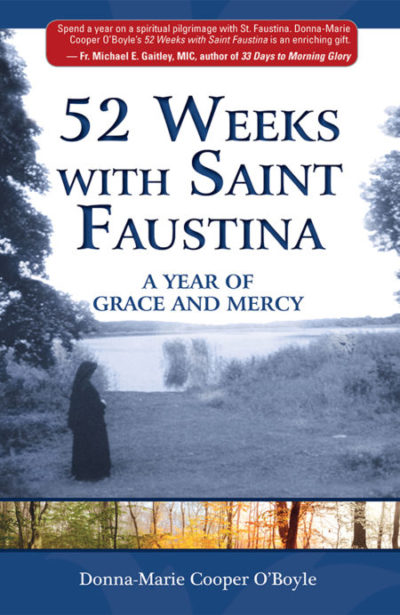The following is an excerpt from my book 52 Weeks with St. Faustina:
“I thirst. I thirst for the salvation of souls. Help Me, My daughter, to save souls. Join your sufferings to My Passion and offer them to the heavenly Father for sinners.”
— Jesus to St. Faustina (Diary, 1032)
Our Savior Jesus, amazingly, thirsts for our love. It might seem hard to believe — after all, He is God! How and why does He thirst for our love? We will take a thorough look at this holy “thirst” of Jesus from the Cross for the salvation of souls and what it entails in this week’s spiritual exercise. Let’s get to it!
The human heart is restless until it finds God. In the Psalms, we read, “As a deer longs for flowing streams, so my soul longs for you, O God. My soul thirsts for God, for the living God” (Ps 42:1-2). Saint Augustine penned the now familiar words, “[F]or you have made us for yourself, and our heart is restless until it rests in you” (CCC, 30). Man might do tons of searching in all the wrong places and never have peace until he is right with God. But that’s not just a one-sided longing, or a one-sided quest. It’s true that our Lord yearns for us, too, though He is the Creator of the universe. He thirsts for our love.
When Jesus hung dying on the Cross, He uttered the words, “I thirst” (Jn 19:28; NABRE). It was not merely for water that He thirsted. He also thirsted for our love and the salvation of souls. This thirst was expressed immediately after He had gifted to His disciple John (as well as to all of mankind) the eminent gift of His own Mother, when He said, “Here is your mother” (Jn 19:27). Most of us cannot comprehend the full meaning of such a gift. However, we can at least try to remember to call upon Mother Mary often in all of our needs. She will pray for us, protect us, and mother us! Mary is our wonderful mediator. She will show us how to satiate her Son’s thirst for love and for souls.
Mother Mary knows all about the need to save souls — the souls for whom Jesus thirsts. Mary is fully aware of the problems and blessings of our sinful world, and has always been closely united to her Son’s work of salvation, right from the start. She continues to work from Heaven. We can recall that when Mary appeared to three simple peasant children in Fatima, Portugal, in 1917, she offered several “tools” to save souls. One such tool is praying the daily Rosary. Another is committing to the Five First Saturdays devotion. Further, praying a powerful prayer that she taught the children (Lucia, Francisco, and Jacinta) is most effective: “O Jesus, this is for love of You, for the conversion of poor sinners, and in reparation for the offenses committed against the Immaculate Heart of Mary.” The Blessed Mother taught the children this prayer during her July 13, 1917, apparition. It can be prayed at any time, especially when offering up a specific suffering or situation to our Lord, asking Him to use it for the purposes mentioned in the prayer. The simplest thing can be trans- formed into a formidable means to save souls! In this way, we are helping to satiate Jesus’ thirst!
Mother Teresa, St. Faustina, and Jesus’ Thirst
In discussing Jesus’ thirst for the salvation of souls, I can’t help but think of St. Mother Teresa of Calcutta, who was deeply impacted by Jesus’ thirst for the salvation of souls and, in fact, founded a religious order that would work to accomplish their salvation. Mother Teresa was a Catholic nun who received what she referred to as a “call within a call” when, on September 10, 1946, she was on a train en route to her yearly retreat in Darjeeling. Mother Teresa experienced a mystical vision of Jesus on the Cross, uttering the words, “I thirst.” Jesus called to this simple nun’s heart and asked her to take care of His poorest — “the least.” Mother Teresa totally embraced Jesus’ invitation. After an exercise of due diligence and following normal protocol, the Church’s hierarchy reviewed Mother Teresa’s proposal for the religious order she would found and gave her permission to step out in faith, following the call of the Lord. On August 17, 1948, Mother Teresa crossed over the threshold from the peaceful order of the Loreto convent into the unpredictable, sometimes dangerous, slums of the poor. On October 7, 1950, Mother Teresa and 11 companions (some were her former students!) were established officially as a religious congregation of diocesan right.
Mother Teresa stated, “The General End of the Missionaries of Charity is to satiate the thirst of Jesus Christ on the Cross for Love and Souls.” She included these words in the order’s Statutes. In each of the Missionaries of Charity (MC) convent chapels all around the world, the words “I THIRST” are prominently displayed on the wall, close to the altar and tabernacle. Mother Teresa explained, “We have these words in every chapel of the MCs to remind us what an MC is here for: to quench the thirst of Jesus for souls, for love, for kindness, for compassion, for delicate love.”51 I have been personally blessed to meditate upon these simple, yet profound, words in many of the MC chapels in various places around the world.
On March 25, 1993, Mother Teresa explained the meaning of the words “I thirst” in a letter to her community. She wrote, “‘I thirst’ is something much deeper than just Jesus saying ‘I love you.’ Until you know deep inside that Jesus thirsts for you — you can’t begin to know who He wants to be for you. Or who He wants you to be for Him. The heart and soul of [Missionaries of Charity] is only this — the thirst of Jesus’ Heart, hidden in the poor. … ‘I thirst’ and ‘You did it to me’ — remember always to connect the two.”
Just after Mother Teresa passed on to her eternal reward, St. John Paul II described the saint of the gutters’ holy mission:
Her mission began every day, before dawn, in the presence of the Eucharist. In the silence of contemplation, Mother Teresa of Calcutta heard the echo of Jesus’ cry on the Cross: “I thirst.” This cry, received in the depths of her heart, spurred her to seek out Jesus in the poor, the abandoned, and the dying on the streets of Calcutta and to all the ends of the earth.
Later, at her beatification on October 19, 2003, the pope expressed similar sentiments:
The cry of Jesus on the Cross, “I thirst” (Jn 19:28), expressing the depth of God’s longing for man, penetrated Mother Teresa’s soul and found fertile soil in her heart. Satiating Jesus’ thirst for love and for souls in union with Mary, the Mother of Jesus, had become the sole aim of Mother Teresa’s existence and the inner force that drew her out of herself and made her “run in haste” across the globe to labor for the salvation and the sanctification of the poorest of the poor.
About 10 years before Mother Teresa experienced hearing Jesus’ words “I thirst,” another great saint in the making would be blessed to hear the same two powerful words spoken to her heart. It was during a vision when Sr. Faustina saw Jesus suffering on the Cross. Sister Faustina recalled, “During Holy Mass, I saw the Lord Jesus nailed upon the Cross amidst great torments. A soft moan issued from His Heart. After some time, He said, ‘I thirst. I thirst for the salvation of souls. Help Me, My daughter, to save souls. Join your sufferings to My Passion and offer them to the heavenly Father for sinners’” (Diary, 1032). What an awesome privilege to be asked by Jesus Himself to help Him save souls! Sister Faustina no doubt took these words to her heart and meditated upon them deeply. She searched for every opportunity to help Jesus save souls by joining her every suffering to His. The humble saint said she didn’t know how to suffer properly. Specifically, she wrote, “I understood that I did not know how to suffer. In order to gain merit for my suffering, I will unite myself more closely, in suffering, to the Passion of the Lord Jesus” (Diary, 1762). This she did often. At another time, Jesus told His bride, “I desire that you know more profoundly the love that burns in My Heart for souls, and you will understand this when you meditate upon My Passion” (Diary, 186).
In a meditation on Jesus’ words, “I thirst,” Pope Francis said:
“Love is not loved”: This reality, according to some accounts, is what greatly upset St. Francis of Assisi. For love of the suffering Lord, he was not ashamed to cry out and grieve loudly.55 This same reality must be in our hearts as we contemplate Christ Crucified, he who thirsts for love. Mother Teresa of Calcutta desired that in the chapel of every community of her sisters, the words “I thirst” would be written next to the crucifix. Her response was to quench Jesus’ thirst for love on the Cross through service to the poorest of the poor. The Lord’s thirst is indeed quenched by our compassionate love; he is consoled when, in his name, we bend down to another’s suffering. On the day of judgment, they will be called “blessed” who gave drink to those who were thirsty, who offered true gestures of love to those in need: “As you did it to one of the least of these my brethren, you did it to me” (Mt 25:40).
Something to Ponder
Both Mother Teresa and St. Faustina acted upon the great invitation of Jesus to help save souls. Also, the shepherd children at Fatima responded to Our Lady’s requests to save souls with their prayers and sacrifices. Calling to mind Jesus’ invitation to Sr. Faustina to “join [her] suffering to [His] Passion and offer them to the heavenly Father for sinners,” can we strive to do the same? Jesus’ cry from the Cross expressing His thirst for the salvation of souls should echo deeply in our hearts. Take time today and this week to ponder these things. Make your life all about being lovingly attentive to the needs of those around you and to saving souls — “connecting the two,” as Mother Teresa suggested. Also, ponder Jesus’ great thirst for your love. Can you strive to satiate His thirst? Jesus has asked in a particular way two of His daughters (Sts. Faustina and Mother Teresa) to help Him to save souls. He beckons to us, as well.
A Merciful Action
Who near you is most in need of God’s love? Knowing that each human heart desires deeply to rest in God’s love, how can you satiate their thirst for God’s love? What work of mercy can you put into practice throughout this week? Pray about it. Here are a few suggestions:
• Go out of your way to help a stranger.
• Take time to truly listen to someone who needs to share (even if you’ve already heard it!).
• Strike up conversations with people around you, allowing them to vent.
• Always mention “prayer” and “God.” Get those powerful words in your conversations! It can help change someone’s life!
A PRAYER OF MERCY FOR THIS WEEK
(To be prayed each day this week.)
Dear Merciful Lord, my Crucified Jesus,
I love You.
I am Your unworthy servant.
Thank You for thirsting for my love.
I want to satiate Your thirst for love and I want to offer my life for the salvation of souls. Mother Mary, please help me.
Saint Faustina, please pray for me.
Jesus, I trust in You!

